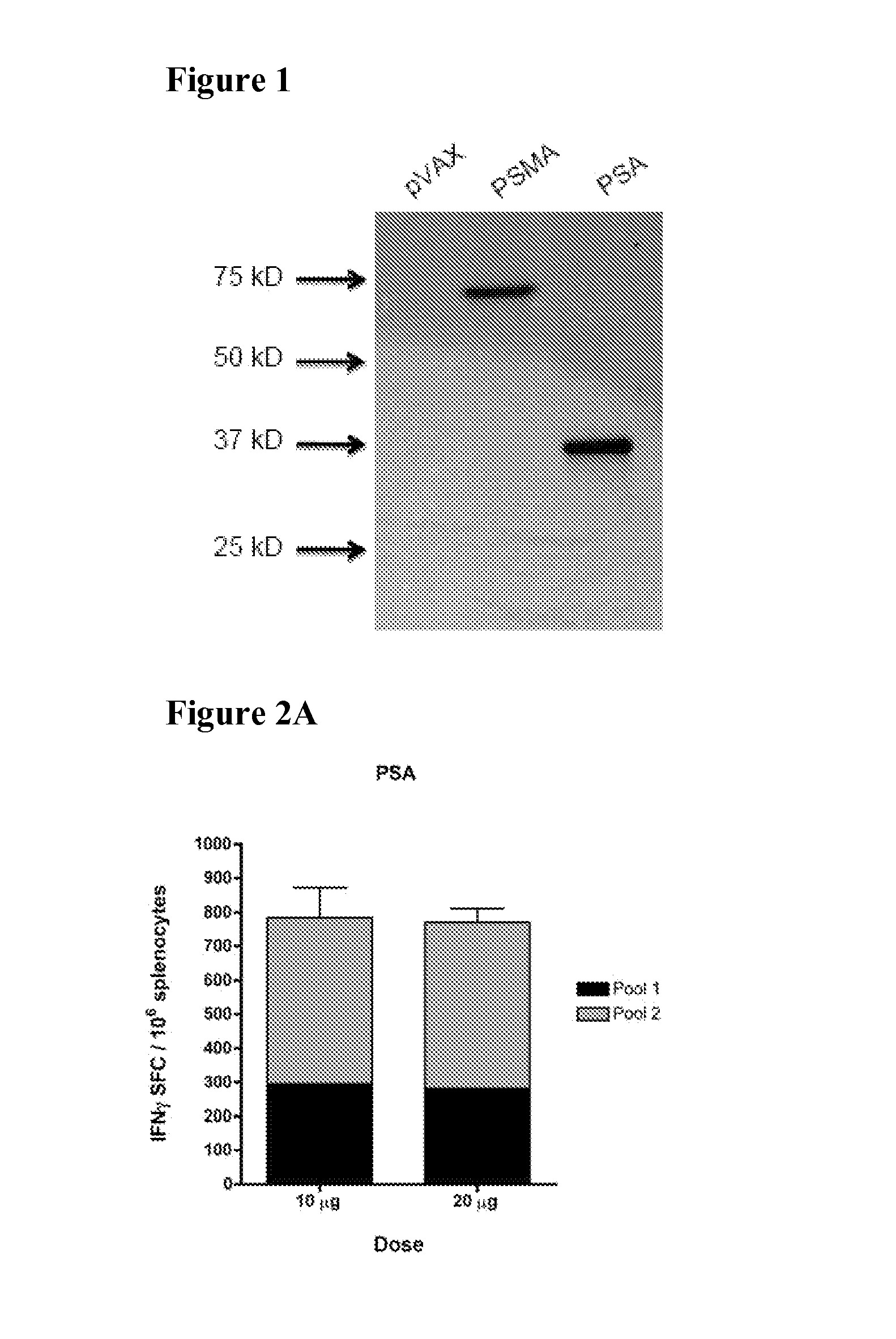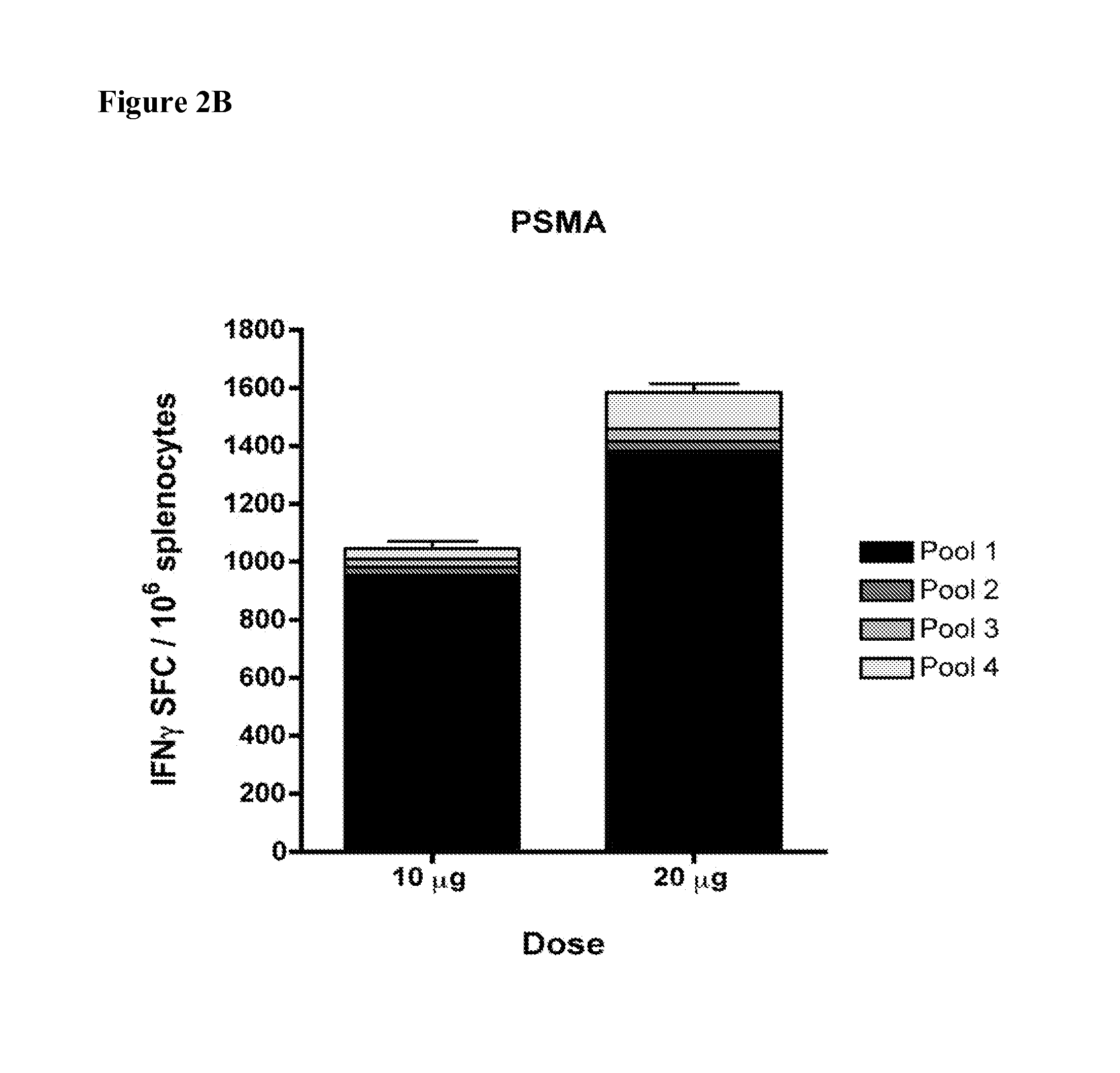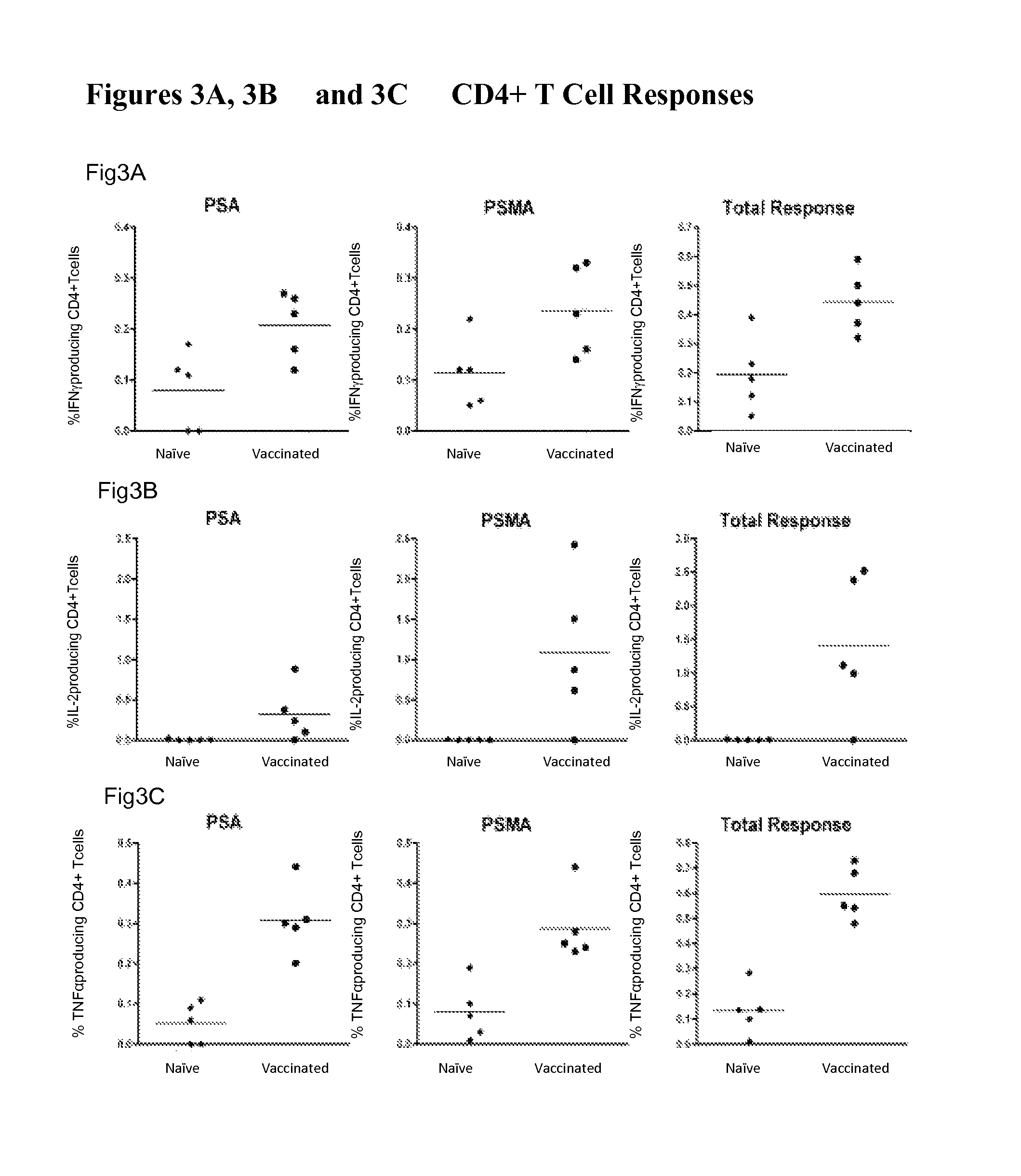Consensus prostate antigens, nucleic acid molecule encoding the same and vaccine and uses comprising the same
a technology of consensus prostate and nucleic acid molecule, applied in the direction of peptides, enzymology, peptidases, etc., can solve the problems of reducing the immunogenicity of the platform, complex development of an immune therapeutic approach, and adoption of dna vaccines
- Summary
- Abstract
- Description
- Claims
- Application Information
AI Technical Summary
Benefits of technology
Problems solved by technology
Method used
Image
Examples
example 1
[0152]Consensus immunogens for PSA and PSMA were designed from the available full-length human and macaque sequences in the GenBank database as previously described in Laddy, D. J., Yan, J., Corbitt, N., Kobasa, D., Kobinger, G. P., Weiner, D. B. (2007). Immunogenicity of novel consensus-based DNA vaccines against avian influenza. Vaccine. 25, 2984-2989, and Laddy, D. J., Yan, J., Kutzler, M., Kobasa, D., Kobinger, G. P., Khan, A. S., Greenhouse, J., Sardesai, N. Y., Draghia-Akli, R., Weiner, D. B. (2008). Heterosubtypic Protection against Pathogenic Human and Avian Influenza Viruses via In Vivo Electroporation of Synthetic Consensus DNA Antigens. PLoS ONE. 3,e2517.
[0153]The consensus antigen sequences were synthesized by GeneScript (Piscataway, N.J.). An HA tag was included in the C-terminus of the antigen sequence. The antigen sequences were optimized for mRNA stability and codon usage in humans. The final sequences were cloned in the BamHI and XhoI sites of the pVAX1 vector (Invi...
example 2
[0157]A consensus PSA antigen 2 (SEQ ID NO:4) was generated. This sequence, which comprises 279 amino acids including an IgE leader sequence, was compared to each of the PSA sequences set forth in Table 2. The PSA sequences used include two human sequences, a sequence from M. fascicularis, and a sequence from M. mulatta. Table 2 includes the SEQ ID NO: and Accession number for each sequence used in the comparison with consensus PSA antigen 2 (SEQ ID NO:4).
[0158]
TABLE 2Number% homologySEQSpecies andAccessionof aminoto SEQ IDID NOproteinNumberacidsNO: 417H. sapiens PSANP001639.126191isol18H. sapiens PSAgbAAA60193.12629019M. fascicularisQ6DT45.126195KLK321M. mulatta PSAAAZ82258.124495
[0159]A multiple sequence alignment of H. Sapiens (SEQ ID NO:17 and SEQ ID NO:18), M. mulatta (SEQ ID NO:21) and M. facicularis (SEQ ID NO:19) PSA sequences was generated with the consensus PSA antigen 1 (SEQ ID NO:4). KLK3 (kallikrein 3) is the gene encoding PSA and is pseudonymous with PSA. The PSA antig...
example 3
[0160]A consensus PSMA antigen 1 (SEQ ID NO:6) was generated. This sequence, which comprises 750 amino acids was compared to each of the PSMA sequences set forth in Table 3. The PSMA sequences used include two human sequences and a sequence from M. mulatta. Table 3 includes the SEQ ID NO: and Accession number for each sequence used in the comparison with consensus PSMA antigen 1 (SEQ ID NO:6).
[0161]
TABLE 3SEQNumber% homologyIDSpecies andAccessionof aminoto SEQ IDNOproteinNumberacidsNO: 622H. sapiens PSMANP_004467.175096GCPII_isol23H. sapiens PSMAAAC83972.17499624M. mulatta GCPIIXP_001096141.273594isol
[0162]A multiple sequence alignment of H. Sapiens and M. mulatta PSMA sequences was generated with PSMA antigen 1. The PSMA antigen 1 consensus sequence (SEQ ID NO:6) is 96% homologous to H. sapiens PSMA (SEQ ID NO:22 and SEQ ID NO:23) and 94% homologous to M. mulatta full-length PSMA protein sequence (SEQ ID NO:24).
PUM
| Property | Measurement | Unit |
|---|---|---|
| Tm | aaaaa | aaaaa |
| temperature | aaaaa | aaaaa |
| temperature | aaaaa | aaaaa |
Abstract
Description
Claims
Application Information
 Login to View More
Login to View More - R&D
- Intellectual Property
- Life Sciences
- Materials
- Tech Scout
- Unparalleled Data Quality
- Higher Quality Content
- 60% Fewer Hallucinations
Browse by: Latest US Patents, China's latest patents, Technical Efficacy Thesaurus, Application Domain, Technology Topic, Popular Technical Reports.
© 2025 PatSnap. All rights reserved.Legal|Privacy policy|Modern Slavery Act Transparency Statement|Sitemap|About US| Contact US: help@patsnap.com



